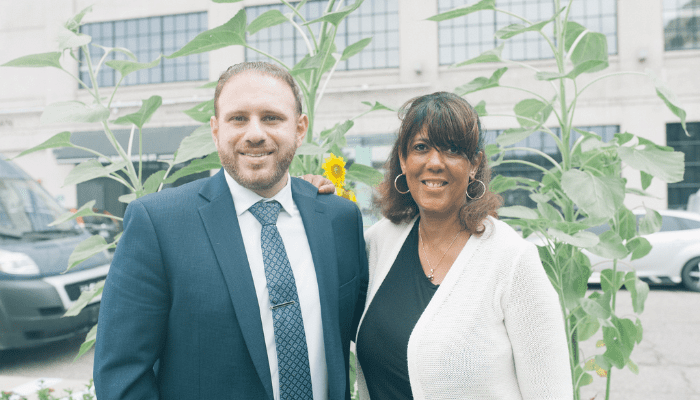
Dr. Ali Bazzi and Robin Wright King, founders of Urban Docz
Telehealth has seen rapid adoption since 2020, surprising healthcare providers and patients with its effectiveness. Telehealth visits reduce barriers to receiving healthcare, especially for patients in metropolitan areas, who may struggle with inaccessible transportation or lack of time due to work or childcare obligations. But when unaffordable healthcare costs are added to this equation, proactive medical appointments can become completely unattainable.
That’s where Urban Docz comes in. This budding tech startup based in Dearborn, Michigan, is developing an affordable, easy-to-use telehealth platform with a focus on cultural competency for its users; women and individuals with reproductive health needs.
We spoke with Robin Wright King and Dr. Ali Bazzi, the founders of Urban Docz and TechTown alumni, to learn more about their startup, their vision for creating greater accessibility to healthcare, and how TechTown Detroit has supported their company’s path to commercialization. Founded in June 2021, Urban Docz is currently in the seed stage, with some early revenue and customers and still testing, developing and optimizing their platform. Urban Docz’s mission is to provide best-in-class healthcare for women seeking support for their reproductive health.[vc_separator]
Robin: Urban Docz is a highly accessible telehealth platform created to serve individuals who may be uninsured or cannot afford out-of-pocket healthcare expenses. We are firm believers that cost should not be a barrier to accessing care.
Dr. Bazzi: Through customer discovery, we realized some people simply do not have health insurance, including government-assisted health insurance. For example, it can take months to receive Medicaid and for pregnant individuals or people managing chronic conditions, the wait may be too long. One of the biggest reasons doctors like me see increases in morbidity and mortality is because of delayed or avoided care. Urban Docz will enable positive health outcomes by offering affordable, accessible healthcare.
Robin: We recognize how important it is to create a platform to connect patients to culturally competent healthcare providers who look like them. A provider’s ability to acknowledge their patients’ lived experience, beliefs and values during treatment results in greater trust—and that’s really important.
Robin: We’re in the process of building our platform and plan to launch our proof of concept in mid to late 2024. The platform will allow individuals to schedule video-based appointments to see healthcare providers, handle electronic health records and document outcomes from appointments. Providers will also be able to prescribe medication as part of a patient’s care plan.
Dr. Bazzi: The platform will be HIPAA compliant and secure all patient information and transcriptions of their appointment conversations. As a provider, I believe that we can improve health outcomes through telehealth and there is a way to do it safely and efficiently. There will also be a billing feature that will eventually allow patients to book a single visit or take part in a subscription model for more regular appointments. The cost of a single appointment will be very affordable–between $15 and $30.
Robin: We conducted more than 300 interviews and found that early adopters for this type of technology will likely be young women between the ages of 18 and 35 who need reproductive healthcare.
Dr. Bazzi: We also found that the people who indicated a need for this platform were in underserved populations without health insurance or middle-income individuals who were not satisfied with their healthcare premiums. We envision the demand for our platform will expand to include a larger range of people after it launches.
Dr. Bazzi: We joined TechTown Detroit’s Start Studio program, which helped us validate our idea, receive coaching and participate in a pitch competition at the end of the program. We won first place, and the funding we received helped us establish our business as a limited liability corporation. Additionally, events hosted by MedHealth, a TechTown initiative have helped us see what others in healthcare innovation are working on and care about, which helped us further refine our product. The networking and mentorship have been invaluable.
Robin: TechTown Detroit and MedHealth have helped us collect data to make informed decisions as we work toward our proof of concept. MedHealth also provided highly tailored support to help us refine our pitch presentation and white paper for a specific competition.

